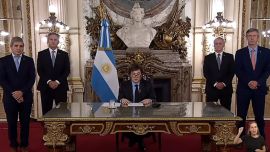Ecuador is seeking a mediator to resolve the stand-off with Britain on the future of WikiLeaks founder Julian Assange, who has been holed up in its London embassy since 2012, the nation’s foreign minister said Tuesday.
Foreign Minister María Fernanda Espinosa said the South American country was looking at the possibility of a "third country or a personality" stepping in to settle the five-year impasse.
Assange, 46, moved into Ecuador's embassy to avoid arrest over a now-dropped Swedish investigation into rape allegations. The Australian citizen has not stepped foot outside the mission since, fearing he could be extradited to the United States and put on trial for WikiLeaks' publication of leaked secret US military documents and diplomatic cables in 2010.
British police have said they are still seeking to arrest him on for failing to surrender to a court after violating bail terms.
"No solution will be achieved without international cooperation and the cooperation of the United Kingdom, which has also shown interest in seeking a way out," Espinosa told foreign correspondents in Quito.
It is the first time Ecuador has proposed mediation to resolve the case.
Political asylum
Swedish prosecutors initially wanted Assange extradited to face the sexual assault allegations, but they dropped their probe against him in May 2017.
The investigation centred on a Swedish woman's complaint that Assange in 2010 had unprotected sex with her without her consent. Assange has denied that, saying the sex was consensual.
Ecuador extended political asylum to Assange but has been unable to secure his passage out of the Embassy without being arrested.
Espinosa said that his situation, "from a human point of view, is not sustainable. A person cannot live forever in these conditions, and we are searching in a very respectful way with the United Kingdom ... for a solution."
The minister has renewed Assange's asylum, which was originally issued under former president Rafael Correa, who stepped down at the end of his third mandate in 2017.
Correa is at odds with his successor, President Lenín Moreno, whom he calls a "traitor," and is trying to wrest control of the ruling PAIS Alliance party from him.
On Monday, Correa said Assange's continued asylum was at risk under Moreno. But Espinosa denied that, saying the diplomatic protection for Assange "will continue unchanged."
She added, however, that the Australian's "physical and psychological integrity are at risk" from the extended confinement in the Embassy.
'Complicated' confinement
"How would you feel after spending five and a half years in a tiny office without feeling the sunlight and without breathing fresh air?" Espinosa asked the journalists.
"Even people kept in detention centres get to go out into a yard, do some sport. That's not the case for Julian Assange. His conditions of confinement are very complicated."
Moreno's government has asked Assange several times to refrain from declarations or activities that could affect Ecuador's international relations. But the Wikileaks founder has made his views known on certain issues, including recently voicing support for an independence drive in Spain's autonomous Catalonia region.
Spain complained that there were signs Assange was "trying to interfere in and manipulate" the Catalan crisis after the outspoken Australian was visited by a prominent Catalan pro-independence figure.
Wikileaks has also come under scrutiny in the United States for contacts with US President Donald Trump's son, Donald Trump, Jr, between September 2016 and July 2017 in relation to emails plundered from the elder Trump's political rival Hillary Clinton's campaign.
- TIMES/AFP























Comments